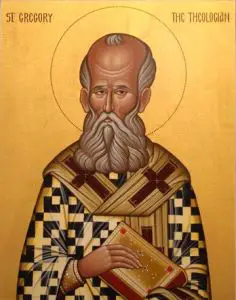The doctrine of the Trinity hinges on the Holy Spirit being a separate person from the Father and the Son. Without this determination, there is no Trinity. What does Scripture have to say about the matter? Has belief in the personhood of the Spirit always been a foregone conclusion? What does the historical record reveal? You may be surprised at what you’re about to read.
Survey Says
In 2014, Lifeway Ministries and Ligonier Ministries surveyed evangelical Christians in America. While the vast majority of the respondents (96%) said they believed in the doctrine of the Trinity, an incredible 51%, more than half, said the Holy Spirit is not a personal being, but rather a force. Another seven percent said they weren’t sure. Only 42% agreed that the Spirit is a person.[1]
What startled many in the Christian community is that these beliefs fly in the face of orthodoxy, which dictates that the Spirit is God, a separate person from the Father and the Son,[2] but co-equal, con-substantial and co-eternal with them. One cannot truly believe in the Trinity without believing this about the Holy Spirit.
Confusion about the Holy Spirit is nothing new, however. Baptist theologian, Millard Erickson, enumerates the wide variety of beliefs held during the fourth century regarding the identity of the Holy Spirit:
A confusing array of beliefs was held about the Holy Spirit at this time…Some considered him an impersonal, unbegotten power whom Christ had promised to send and who therefore became an actual fact only after Christ’s ascension. Others thought of him as a primitive power in the history of salvation. Yet others conceived of him as an active power in the world process as well. A number of persons, taking their cue from the reference to the Holy Spirit as “Paraclete,” considered him to be personal. Of these, some thought of him as a created divine being, others as the highest spiritual being or angel made by God. Some referred to him as the second derivation from the Father, and after the Son, a permanently existing Being sharing in the Godhead itself. Others identified him with the Son himself. Still others identified the Holy Spirit as the Old Testament Wisdom, and noting that Wisdom is feminine in gender in Hebrew, thought of this person as feminine.[3] (emphasis added)
Erickson goes on to say that not only were the Church Fathers silent about the deity of the Spirit at the Council of Nicaea (325 AD), the “church’s liturgical practice did not seem to provide instances of prayer or worship” addressed to the Spirit,[4] something you would expect to see if the Holy Spirit were truly God.

Confusion about the Holy Spirit prevailed among the Church Fathers even up to the Council of Constantinople (381 AD), where the deity and personhood of the Spirit became a part of Church dogma. Gregory of Nazianzus, considered to be one the architects of the creed that was birthed at the council,[5] summarized the divergent beliefs about the Spirit during this time:
Of the wise among us, some hold the Holy Spirit to be a power, others a creature, others for God, and still others are unwilling to decide, out of reverence (or so they say) for the Scriptures, which do not speak plainly on the matter.[6]
In other words, there was no unified doctrine or practice that identified the Holy Spirit as a separate person or a member of a multi-person Godhead for roughly the first four hundred years of the Church’s existence. How is it that those gathered at the Council of Constantinople were able to formulate such a doctrine when there were conflicting viewpoints? Church historian, Kegan Chandler, provides us with insight:
It is interesting that Gregory’s comment about the confusion and disagreement on the Spirit was made in the same year in which the “ecumenical” council, backed by the spears of the violent emperor Theodosius I, decided for all Christians that the Holy Spirit was unquestionably a third co-equal Person.[7]
Not only did Theodosius I inspire, if you will, the council with his history of violence, the fact that he had made the doctrine law by imperial edict in 380 AD, a year before the council at Constantinople ever cast a vote,[8] no doubt helped convince the council that the Holy Spirit was God. Thus, the council, although admittedly confused and divided about the Holy Spirit, nevertheless, decided to agree with the emperor’s edict. The Holy Spirit was to be worshiped and glorified, along with the Father and the Son.[9]
What Do Scholars Have to Say?
Hebrew scholar, Pinchas Lapide, describes the doctrine of the Trinity, and therefore, the doctrine of the Holy Spirit, as one whose progression can be traced over a period of four centuries:
The total picture which arises from history is almost like an arithmetic progression: In the first century, God is still monotheistic in good Jewish fashion. In the second century God becomes two in one; from the third century on, God gradually becomes threefold. Only in the fourth century does the elevation of the Holy Spirit with a special hypostatis with its own value take place.[10] (emphasis added)
In addition to historical evidence that points to the development of the doctrine of the Spirit, we find that Trinitarian scholars are willing to admit that the Bible does not specifically identify the Spirit as God or a separate person from the Father and the Son. For example, the New Catholic Encyclopedia states:
The OT clearly does not envisage God’s spirit as a person, neither in the strictly philosophical sense, nor in the Semitic sense. God’s spirit is simply God’s power.[11]
A Catholic Dictionary expands this assessment to include the New Testament:
On the whole, the New Testament, like the Old, speaks of the spirit as a divine energy or power.[12]
What Does Scripture Have to Say about the Holy Spirit?
 The strongest evidence against the Spirit being a separate person is found in the Scriptures themselves. When Jesus spoke with the Samaritan woman at the well, he described God the Father as spirit:
The strongest evidence against the Spirit being a separate person is found in the Scriptures themselves. When Jesus spoke with the Samaritan woman at the well, he described God the Father as spirit:
John 4:23-26 (NASB) “But an hour is coming, and now is, when the true worshipers will worship the Father in spirit and truth; for such people the Father seeks to be His worshipers. 24 “God is spirit, and those who worship Him must worship in spirit and truth.” (emphasis added)
God is spirit and He expresses or manifests Himself, both His presence and His power, through or by His spirit. For example, as early as chapter one of Genesis, God’s spirit is described as the Spirit of God:
Genesis 1:1-2 (NASB) In the beginning God created the heavens and the earth. 2 The earth was formless and void, and darkness was over the surface of the deep, and the Spirit of God was moving over the surface of the waters. (emphasis added)
The text does not read “God the Spirit,” as some are want to interpret it in an attempt to establish a proof text for the Holy Spirit as a separate member of a triune God. Rather, the text simply reads that it was the Spirit of God or God’s Spirit, that was at work.
In addition to Genesis 1, numerous other Old Testament passages record God (Yahweh) making references to His Spirit. For example, God makes such statements as, “My Spirit shall not strive with man forever…”[13] and “I will pour out My Spirit on all mankind…”[14] Speaking of the coming Messiah, God said, “I have put My Spirit upon him.“[15]
What’s more, Scripture specifically equates God’s Spirit with the Holy Spirit:
Isaiah 63:10 (NASB) But they rebelled and grieved His Holy Spirit; Therefore He (Yahweh) turned Himself to become their enemy, He fought against them.[16] (emphasis added)
The New Testament, naturally, confirms this truth:
Romans 8:11 (NASB) But if the Spirit of Him who raised Jesus from the dead dwells in you, He who raised Christ Jesus from the dead will also give life to your mortal bodies through His Spirit who dwells in you. (emphasis added)
Who raised Jesus from the dead? According to Scripture, it was God the Father.[17] Thus, the Holy Spirit is the Spirit of God the Father.
Additional convincing proofs regarding the Spirit’s identity can be found throughout the New Testament as well. For example, Paul makes it clear that the Holy Spirit is God’s Spirit:
1 Thessalonians 4:8 (NASB) So, he who rejects this is not rejecting man but the God who gives His Holy Spirit to you. (emphasis added)
Ephesians 4:30 (NASB) Do not grieve the Holy Spirit of God, by whom you were sealed for the day of redemption. (emphasis added)
For Paul, God is a designation for the Father alone.[18] It is His Spirit that is synonymous with the Holy Spirit.

The gospels attest to this as well. When Jesus exhorted his disciples not to worry about the coming persecution, he assured them that they would be supernaturally equipped to give a defense of their faith. Notice how the inspired accounts describe the source of this help:
Matthew 10:19-20 (NASB) “But when they hand you over, do not worry about how or what you are to say; for it will be given you in that hour what you are to say. 20 “For it is not you who speak, but it is the Spirit of your Father who speaks in you. (emphasis added)
Mark 13:11 (NASB) “When they arrest you and hand you over, do not worry beforehand about what you are to say, but say whatever is given you in that hour; for it is not you who speak, but it is the Holy Spirit. (emphasis added)
In these parallel passages, we discover that the Spirit of your Father is synonymous with the Holy Spirit.
This reality is repeated at Jesus’ baptism. Each of the four gospels record this important event in the life of Jesus, and in the process, we see various synonymous terms used for God’s Spirit:
Matthew 3:16-16 (NASB) After being baptized, Jesus came up immediately from the water; and behold, the heavens were opened, and he saw the Spirit of God descending as a dove and lighting on Him (emphasis added)
Mark 1:9-10 (NASB) In those days Jesus came from Nazareth in Galilee and was baptized by John in the Jordan. 10 Immediately coming up out of the water, He saw the heavens opening, and the Spirit like a dove descending upon Him (emphasis added)
Luke 3:21-22 (NASB) Now when all the people were baptized, Jesus was also baptized, and while He was praying, heaven was opened, 22 and the Holy Spirit descended upon Him in bodily form like a dove, and a voice came out of heaven, “You are My beloved Son, in You I am well-pleased.” (emphasis added)
John 1:32 (NIV) Then John gave this testimony: “I saw the Spirit come down from heaven as a dove and remain on him. (emphasis added)
Thus, the Spirit of your Father, the Spirit of God, the Holy Spirit, and the Spirit are all synonymous terms for God the Father’s Spirit.
The Spirit of a Man is Not a Separate Person
Quite often the Bible speaks of man’s spirit. For example:
Psalm 142:3 (NASB) When my spirit was overwhelmed within me, You knew my path… (emphasis added)
Ezra 1:1 (NASB) …the LORD stirred up the spirit of Cyrus king of Persia… (emphasis added)
Luke 1:46-47 (NASB) And Mary said: “My soul exalts the Lord, 47 And my spirit has rejoiced in God my Savior. (emphasis added)
Acts 17:16 (NASB) Now while Paul was waiting for them at Athens, his spirit was being provoked within him… (emphasis added)
Few, if any, would argue that the spirit of a man is a separate person from the man. In the same way, God’s Spirit is not a separate person from God. Paul makes this same analogy in his letter to the Corinthians:
1 Corinthians 2:11 (NASB) For who among men knows the thoughts of a man except the spirit of the man which is in him? Even so the thoughts of God no one knows except the Spirit of God. (emphasis added)
Chandler explains, “In this way the ‘spirit’ denotes the mind or reason of a particular person, not another distinct person from him.”[19]
What is the Holy Spirit?
If the Spirit is not a separate person from the Father and the Son, what is it? According to the Dictionary of Judaism in the Biblical Period, the Spirit is God’s presence and power:
Just as “spirit” was considered the essence of human life, so analogously the term “spirit” was used of the presence, activity, and power of God, that is, characteristics that demonstrate that God is truly a “living God.”[20] (emphasis added)
The Spirit of God Speaks of God’s Presence
David penned a psalm that further helps us identify the Spirit as God’s presence. He asked God (Yahweh):
Psalm 139:7 (NASB) Where can I go from Your Spirit? Or where can I flee from Your presence? (emphasis added)
 Here, David employs a literary device known as a synonymous parallelism, which “involves the repetition in the second part of what has already been expressed in the first, while simply varying the words.”[21] Where can I go is synonymous with where can I flee. And from Your Spirit is synonymous with Your presence. Thus, God’s Spirit is synonymous with God’s presence.
Here, David employs a literary device known as a synonymous parallelism, which “involves the repetition in the second part of what has already been expressed in the first, while simply varying the words.”[21] Where can I go is synonymous with where can I flee. And from Your Spirit is synonymous with Your presence. Thus, God’s Spirit is synonymous with God’s presence.
David uses a similar parallelism in his psalm of repentance:
Psalm 51:10-11 (NASB) Create in me a clean heart, O God, and renew a steadfast spirit within me. 11 Do not cast me away from Your presence And do not take Your Holy Spirit from me. (emphasis added)
Here, Your presence is synonymous with Your Holy Spirit. The Holy Spirit is the presence of God and not a separate person from God.
God’s Spirit is Indicative of God’s Power
In addition to God’s Spirit being God’s presence, it’s also indicative of His power. For example, when the Pharisees accused Jesus of casting out demons by Beelzebul, that is, Satan, he countered by swiftly identifying the source of his power:
Matthew 12:27-28 (NASB) “If I by Beelzebul cast out demons, by whom do your sons cast them out? For this reason they will be your judges. 28“But if I cast out demons by the Spirit of God, then the kingdom of God has come upon you. (emphasis added)
Luke’s account of the same event underscores the fact that the Spirit of God is not a separate person from God:
Luke 11:20 (NASB) “But if I cast out demons by the finger of God, then the kingdom of God has come upon you. (emphasis added)
The Spirit of God and the finger of God are synonymous terms that depict the power of God. Surely, no one will claim that the finger of God is a separate person from God.
Another example worth reviewing is found in Jesus’ birth narrative:
Luke 1:35 (NASB) The angel answered and said to her, “The Holy Spirit will come upon you, and the power of the Most High will overshadow you; and for that reason the holy Child shall be called the Son of God. (emphasis added)
In this passage, the Holy Spirit will come upon you is synonymous with the power of the Most High will overshadow you. In other words, the power of the Most High is another way to describe the Holy Spirit.
The Spirit After Jesus’ Ascension
 After Jesus’ ascension, God’s Spirit, that is, the Holy Spirit, became the vehicle for Jesus’ presence in the earth.[22] Professor and theologian James D.G. Dunn explains:
After Jesus’ ascension, God’s Spirit, that is, the Holy Spirit, became the vehicle for Jesus’ presence in the earth.[22] Professor and theologian James D.G. Dunn explains:
For the NT writers generally the Spirit is the Spirit of God, the effective power of God himself. This is obviously true when speaking about Jesus’ conception and of his ministry, but it is also true in speaking of the Spirit after Jesus’ exaltation. However much the Spirit can be understood as the Spirit of Christ, the Spirit is still primarily the Spirit of God, God himself reaching out to and touching, vitalizing, dynamizing man at the heart of his being.[23] (emphasis added)
Some may contend that the use of personal pronouns for the Holy Spirit, especially in the gospel of John, constitutes proof of personhood. However, this understanding is negated in light of the fact that translators, moved perhaps by a Trinitarian bias, ignored standard grammatical rules for translation. Instead of rendering neutral pronouns regarding the Spirit as it and which, they translated them as masculine ones, he and who, giving the reader the impression that the Spirit is a person. (You can read this post for more details.)
Conclusion
The Holy Spirit is not a separate person from the Father and the Son. Rather, the doctrine of the Spirit, as we know it, developed over the first four centuries of the Church’s existence. Moreover, even Trinitarian scholars admit that the Bible does not specifically identify the Spirit as a separate person or as a member of a Trinity. What’s more, there are numerous texts that present solid evidence that the Holy Spirit is the Spirit of God the Father.
The ramifications for the Holy Spirit not being a separate person from God the Father and Jesus are far reaching. Without the personhood of the Spirit, there is no longer a basis for the Trinity.
[1] Kevin P. Emmert, “New Poll Finds Evangelical’s Favorite Heresies,” Christianity Today. 28 October 2014. Web. 14 November 2014. https://virtueonline.org/new-poll-finds-evangelicals-favorite-heresies
[2] The Athanasian Creed: https://www.crcna.org/welcome/beliefs/creeds/athanasian-creed
[3] Millard J. Erickson, God in Three Persons: A Contemporary Interpretation of the Trinity (Grand Rapids: Baker Publishing Group, 1995), pg 87-88.
[4] Ibid.
[5] The Nicene Creed, also known as Nicene-Constantinopolitan Creed, was rendered at the Council of Constantinople in 381 AD. It is not to be confused with the Creed of Nicaea decided upon at the Council of Nicaea in 325 AD.
[6] Gregory of Nazianzus, quoted by Philip Schaff, Samuel Macauley (ed.), “Macedonius,” The New Schaff-Herzog Encyclopedia of Religious Knowledge (Grand Rapids: Baker House, 1963), p. 112.
The New Schaff-Herzog Encyclopedia of Religious Knowledge, p. 112 ↵ (Grand Rapids: Baker House, 1963), p.112
[7] Kegan Chandler, The God of Jesus in Light of Christian Dogma, (McDonough, GA: Restoration Fellowship, 2016) p.496.
[8] Ibid, p. 219.
[9] https://www.crcna.org/welcome/beliefs/creeds/nicene-creed
[10] Pinchas Lapide, Jewish Monotheism and Christian Trinitarian Doctrine: A Dialogue by Pinchas Lapide and Jurgen Moltmann (Philadelphia:Fortress Press, 1981), p.39
[11] “Spirit of God,” New Catholic Encyclopedia, 1965, Vol. 13, p. 574.
[12] A Catholic Dictionary, William E. Addis & Thomas Arnold, 1960, p 822-830.
[13] Genesis 6:3.
[14] Joel 2:28-29 (Acts 2:17-18, 32-33).
[15] Isaiah 42:1.
[16] The context here is refers to Yahweh; see verse 7. See also Isaiah 63:11 and Psalm 51:11.
[17] Galatians 1:1, for example.
[18] For example, 1 Thes 1:1, 3; 3:11, 13; Ephesians 1:2-3, 17; 1 Timothy 2:5; 1 Corinthians 8:6, etc.
[19] Chandler, p. 503.
[20] Jacob Neusner, William Scott Green (ed.), Dictionary of Judaism in the Biblical Period (Peabody: Hendrickson Publishers, 1996), p. 298.
[21] Encyclopaedia Britannica, accessed 2-5-20, https://www.britannica.com/topic/biblical-literature/Psalms#ref1096330
[22] John 14:16-20, 23; 1 John 2:1; Romans 8:9-11, etc.
[23] James D.G. Dunn, Christology in the Making, Christology, Second edition, (SCM Press, Ltd. 1996), p. 148.





Sunday 11-20-22 1st. Day Of The Weekly Cycle, Cheshvan 24, 5783 60th. Fall Day
Great information we are thinking about the below question, thank you.
Is the Holy Spirit a Separate Person From the Father and the Son?
Love always, Walter and Debbie